
Use PPC to Capitalize on Labor Day Spending
As summer starts to wrap up, many people are looking forward to one last big celebration before the kids head back to school and the adults leave their vacation plans behind for a few months. As the unofficial marker of the change from summer to the more responsible days of fall, Labor Day becomes a sort of last hurrah for people wanting to get in some shopping and carefree leisure time.
For marketers, that means while much of the country is taking Labor Day weekend off, you face one of the most important weekends of the year for gaining new sales. Analysts expect people to spend $2.83 billion on travel-related purchases alone. And on top of that, Labor Day is a huge weekend for several other key industries.
People are ready to pull out their pocketbooks this time of year and you need to be ready with marketing campaigns that get your deals and products in front of them. Here are a few tips and insights that can help.
What People Buy on Labor Day Weekend
It’s a marketing cliché, but it’s true. Your first step is always to consider what your potential customer wants and what they’re thinking. Part of that equation for Labor Day weekend is thinking through the types of items they’re most likely to be buying.
You can prioritize your PPC campaigns around the items that your audience is most likely to be looking for this weekend in order to maximize your investment. The products that account for most Labor Day spending can be divided into two main categories.
Items People Expect to Be on Sale
Labor Day weekend is known for being a time of big sales, so savvy shoppers are likely to plan on making some of their big purchases for the season during the week. Some of the main types of products they’ll be looking to save on this Labor Day are:
- Clothes
- Electronics
- Home appliances
- Vehicles
- Mattresses
- Back-to-school supplies
If you sell anything that falls into those categories, take this time to really promote those products. And make sure you provide tempting discounts and specials – that’s what the people making purchases in this category will be looking for.
Purchases Made for Labor Day Celebrations
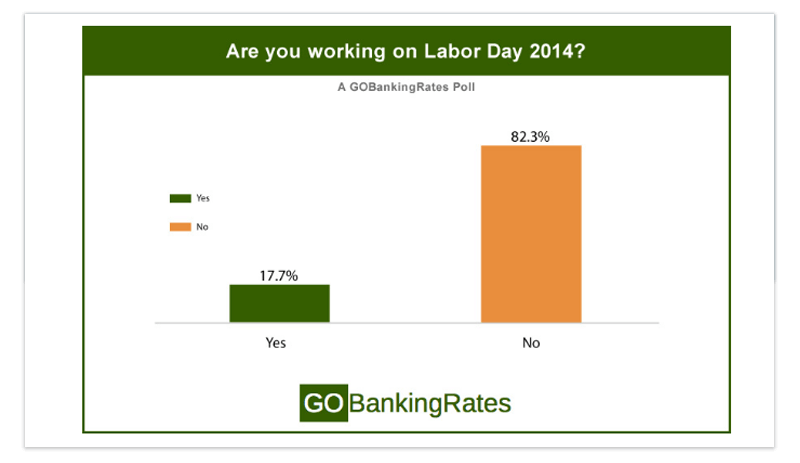
Source: Go Banking Rates
Being that 82% of the U.S. population gets Labor Day off, millions of people will be finding a way to celebrate. That means weekend trips, backyard BBQs, eating out, going to the movies, trips to the beach – all those things people do when they finally have the time to enjoy a few days of leisure. And all of those activities require buying things.
Purchases in this category include a wide variety of products and spending, but a few examples are car rentals, hot dogs, sunscreen, gas for the car, beers and wine, and books. Think of everything you and your family buy when you go on a summer vacation and it’s likely to be something Labor Day shoppers want too.
If your business sells products that fall in this category, then the week of Labor Day is one of the best times of the year to get attractive offers in front of your prospective customers.
How People Shop on Labor Day
You should already have buyer personas developed for your business, but in addition to thinking about crafting and targeting campaigns based on your personas, you should also think about the different ways people shop during a holiday like Labor Day.
Based on search data, Google has identified four main categories of buyer during Labor Day weekend. There’s some overlap in the four categories, but being familiar with all of them can help you make sure your campaigns are optimized for each type of shopper.
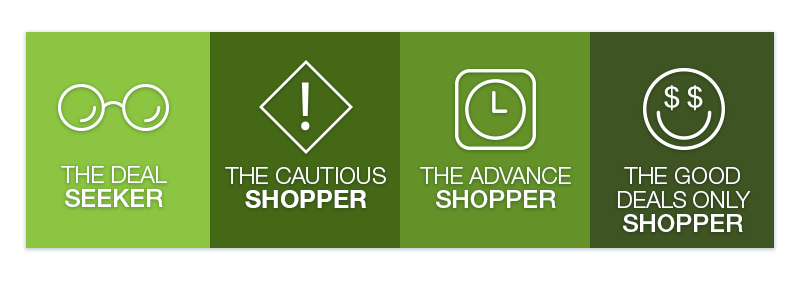
The Deal Seeker
Deal seekers love Labor Day because of all the sales. They’re less likely than other categories to have a specific idea of what they’re looking for; they’re just out to spot a good deal. That means a good ad and discount could be enough to make them consider buying something from you that they didn’t even know they wanted yesterday.
The Cautious Shopper
The cautious shopper takes time to make a purchasing decision. For their Labor Day shopping, they’ll do o a lot of research into the different deals available and how the prices and products compare. While price is a big consideration in their decision, they’re looking for value at least as much savings, and are therefore more likely to research how different products compare in addition to how their prices this week differ. They’re more likely than deal seekers to be shopping from a list of specific items they need, but they may be willing to venture from it for a good enough deal.
The Advance Shopper
This shopper takes their time. They won’t make any rash decisions to take advantage of deals on Labor Day itself, instead they’ll spread their shopping and research out over the days leading up to Labor Day as well. They’ll still be looking for Labor Day deals and specials in that time; they just don’t want to feel rushed to make all their decisions the day of.
The Good Deals Only Shopper
The good deals shopper is similar to the deal seeker in treating finding the best deal as a top priority, but they’re more focused in the types of products they’re looking for. They’re not going to buy something they don’t really need just because the price is right. They’re making use of Labor Day sales specifically to get better prices on items they were already thinking about buying. And they’re more likely not to bother buying an item at all if they feel the deal isn’t good enough. They usually start searching before Labor Day and will take time to compare your offers to those of your competitors.
PPC Strategies to Reach Different Labor Day Shoppers
Many marketing tactics focus on increasing awareness of your brand in general and those have their place, but when you’re looking to reach people already at the stage of looking to buy something, one of the best tactics you have is PPC.
Pay-per-click ads show up right when someone’s looking for the particular type of product you’re selling and thus give you the power to capture their attention at the moment that matters most. For Labor Day shoppers that are heading to the web looking to shop and research deals, strong PPC campaigns can bring them straight to your doorstep (or your online shopping cart).
Best Practices for Reaching All Labor Day Shoppers
While you should shape your campaigns to appeal to all of the different types of the shoppers we’ve talked about – and we’ll get into how to do that later – there are a number of steps you should take to make sure your PPC campaigns for all of them are strong.
Target your ads based on your buyer’s personas.
The four categories of Labor Day shoppers we described shouldn’t replace your marketing personas in shaping your campaign. They should instead be treated as additional insights into how the people in your target audiences are likely to behave. You’ll still want to make use of the targeting options Google Adwords provides to make sure your ads are shown to the people most likely to become customers.
You have a few targeting options that will help you focus your ads on the people you most want to reach:
- Geographic targeting – If you’re trying to drive people in-store, make sure your ads show up for the people searching within a certain radius of your physical store locations.If the people in your target audience are more likely to live in some areas than others – for example, if they’re more likely to live in big cities than out in the country –geographic targeting can be helpful for that as well.If you’re promoting products related to how people will spend their Labor Day, then another useful tip is to pay attention to the weather in different areas you’re targeting. It makes less sense to promote ads for sunscreen or BBQ items in a city that’s raining than one where it’s sunny.
- Demographic targeting – Adwords allows you to target your ads based on age range, gender, parental status, and household income. This is the area where you have the most power to match your campaign targets to your specific personas. You can both choose who to target in your ads and who to exclude. For example, you can tell Adwords not to show your ads for women’s bathing suits to men.
- Topic targeting – For ads on the display network, you can target where your ads will show up based on the topics covered on a page or site. So for examples, if you’re promoting a car rental agency, you can tell Adwords to show your ads on travel sites where people are most likely to be researching and planning their Labor Day trips.
Focus on mobile.
People now spend more time on their smartphones than they do on desktops. That’s true on a normal day, but on a weekend where most people will be off work and traveling, you can expect the majority of the people looking for products and sales online to be doing so from a mobile device.
You therefore must make mobile a priority in your campaigns. Use the device targeting option in Google Adwords to ensure more of your spending goes to ads displayed on mobile and make sure that all your campaigns and landing pages are optimized for the small screens of mobile devices.
Target seasonally specific keywords.
Many people looking for deals on and around Labor Day will be searching for terms specific to the holiday. You don’t want to lean only on your usual keyword research this time of year. Capitalize on the holiday-specific searches you know will be common.
Since Google’s Keyword Planner doesn’t provide seasonally specific search data, your best bet is turning to Google Trends for this.
You can narrow your search by a date range (say, through the five days before and after Labor Day last year) and plug in search terms relevant both to your products and Labor Day sales to see how they performed during that time frame.
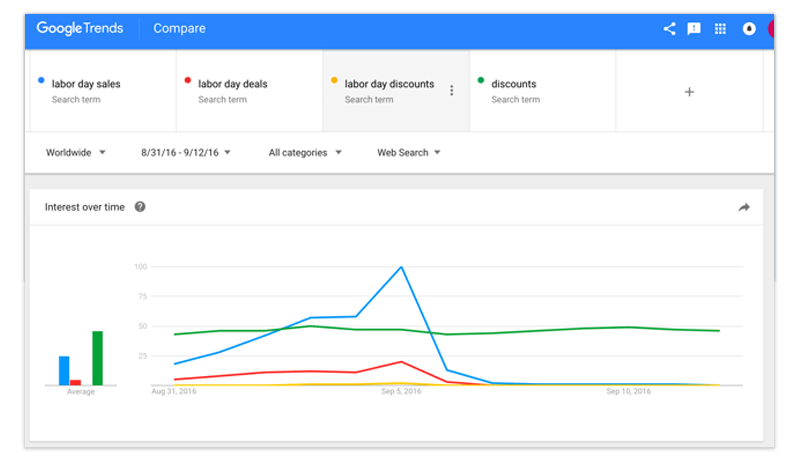
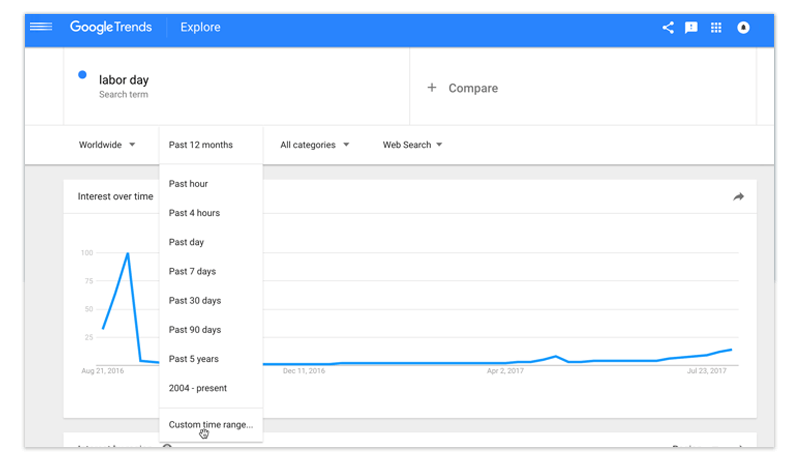
Scrolling down from the main graph on the page, you’ll see a “Related queries” section that provides examples of related keywords and data on how commonly used each keyword was during the time of your date range.
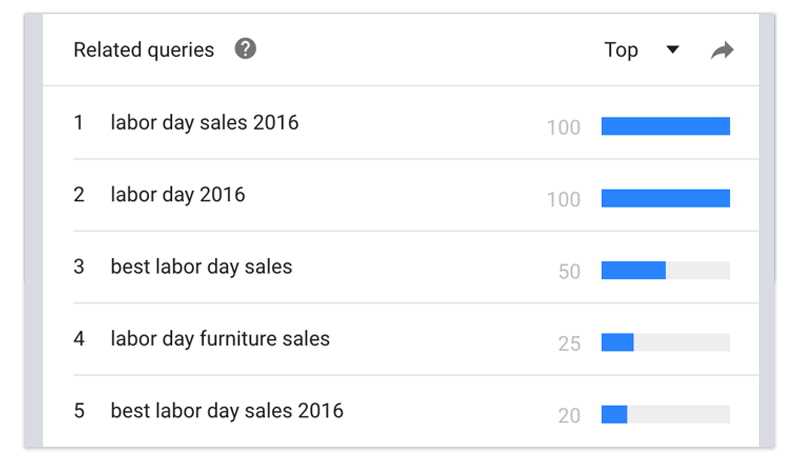
Use this data, along with any internal analytics you have related to how last year’s campaigns performed, to plan the keyword targeting for your Labor Day PPC campaigns.
Make sure your deals are competitive.
People are expecting to see sales and deals during Labor Day and lots of them. If yours look unimpressive when put next to a competitor’s, you’ll lose out on the sale. It’s important to not just offer deals to incentivize purchases, but that they’re the kind of deals that people have a hard time passing up.
Keep an eye on what your competitors are offering in their Labor Day specials so you can be sure your ads are promising something at least as good.
Tips for Reaching the Deal Seeker
The deal seeker will do most their shopping on Labor Day itself and will be respond best to ads that make the pricing and discount level clear upfront. They also care about shipping costs, so will be quicker to take advantage of a deal if they know there’s free shipping.
To make sure your ads appeal to them:
- Emphasize free shipping clearly in your ad.
- Emphasize discounts and coupon codes.
- Make sure your ads are designed to provide an optimal experience on mobile.
- Include price extensions for your mobile ads, so they can easily see their pricing options upfront.
- Keep your ad budget caps high on Labor Day so you don’t lose out on potential sales.
For the customers that respond to ads designed to attract deal seekers, pair your ads with a CTA on the landing page to sign up for your email list in exchange for an extra discount. That’ll sweeten the deal for them and you can put them on your email list for customers who respond well to discounts and coupons.
Tips for Reaching the Cautious Shopper
Like the deal seeker, your cautious shopper is going to do most of their shopping on Labor Day, but they’ll take more time to search, browse, and research their options before making a purchase.
To make sure your ads appeal to them:
- Use product-focused keywords. They’re not just looking for any deal, they’re looking for deals on specific things they need.
- Use retargeting. Since they’ll probably visit your site along with several others before making a decision, you want to make it as easy as possible for them to find you again.
- Make it clear on your ads and landing pages that you have many deals on your website. They may be searching for specific products, but if you have more than one they need, you want to make sure they know about it.
- Make sure your ads and landing pages are optimized for mobile here too, these shoppers are likely to be using their mobile devices.
- As with deal seekers, since they’ll be doing much of their shopping on the day of, you’ll want to keep your budget caps higher than usual so you don’t miss out on their clicks that day.
For cautious shoppers, take the opportunity to craft a CTA on your landing pages that urges them to sign up for your email list to receive content about reviews, comparisons, and deals. You can add them to an email list that promotes content for research-oriented shoppers.
Tips for Reaching the Advance Shopper
Advance shoppers will be on the lookout for deals and specials before Labor Day. You’ll need to be thinking in advance to make sure your campaigns reach them when they’re ready to find you. The main thing you need to do for these shoppers is make sure your Labor Day PPC campaigns start early – a week or so in advance of Labor Day weekend.
In addition to that, here’s how you can make sure your ads will appeal to them:
- Still target Labor Day specific keywords for your campaigns that start early –that’s what they’ll be looking for, they’ll just get there sooner than everyone else.
- Use remarketing with them as well. If they’re researching over several days, it could be easy to forget the item they were considering on your site. Give them reminders throughout the rest of the week.
- Since these shoppers are more likely to re-visit your site and view the same product more than once in their search, make sure your deals either stay consistent or get better – you don’t want to lose them because of a “Great Deal!” that’s higher than what was listed yesterday.
These are researchers ike the cautious shoppers. Make sure your landing pages include plenty of information for them and use a CTA for your email list that promotes informational content as well as deals.
Tips for Reaching the Good Deals Only Shopper
These consumers will be hyper focused on just the things they need and will make most of their purchasing decisions on price. Like the advance shoppers, they’ll probably do their shopping over a few days rather than all on Labor Day. Your good deals only shopper will respond to a lot of the same tactics as people in our other categories, but with a couple of additional tips you should try.
To create PPC ads that appeal to them:
- Start your campaigns a few days before Labor Day, so you’ll catch the attention of good deals only shoppers looking in advance.
- Use product specific keyword targeting. They’re looking for something specific and you want them to find it.
- Promote items they’re likely to need on Labor Day or in the near future, like back-to-school supplies or items they’re likely to use in their travels and celebrations for the weekend.
- Make sure your ads are mobile friendly, since they’re another group likely to be doing their shopping on mobile.
For these shoppers, you want to go back to a CTA that emphasizes deals and make sure if they sign up, that they go on your email list that primarily focuses on promoting discounts and specials to subscribers.
If you play your cards right, you could not only make big profits with PPC this Labor Day, but also capture some customers likely to respond to future campaigns and buy from you again. And if you can get a feel for which customers this Labor Day fall into which category, you’ll be in a great position to tailor your future marketing to them based on the shopping preferences they respond best to.




